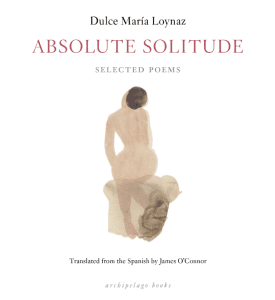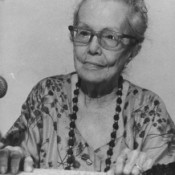Absolute Solitude. Dulce Maria Loynaz. Translated from the Spanish by James O'Connor. Archipelago Books. Brooklyn, New York. 2016.

"The world gave me many things, but the only thing I ever kept was absolute solitude."
- Dulce Maria Loynaz
Dulce Maria Loynaz (1902-1997) published her first book in Cuba in 1938. She was popular in Spain in the 1950s. She was not popular with the Castro government, she refused to join the communist party, her books were taken out of libraries and effectively censored and as a result she was no longer published, she retired to her home in Havana, in seclusion.
In 1992 Dulce Maria Loynaz was awarded the Premio Miguel de Cervantes - the biggest prize for literature in the Spanish speaking world. Her work was allowed to be published in Cuba again.
Absolute Solitude represents the prose poetry of Loynaz, previously unseen and unavailable in English. This poetry is entirely contemporary, modern and vibrant.
LVIII
I am bent over your image like the woman I saw this afternoon
washing her clothes in the river.
On my knees for hours, hunched over the black river of your
absence.
...
Absolute Solitude presents as one poem with a myriad of numbered verses and voices. The most constant lament is about loss, of love, security, future. But Loynaz is never whining, these poems are always an accurate measure of intense keening.
Dulce Maria Loynaz is a one line master:
"As passionate and delirious as an ugly woman's love."
Or two line:
"There is still one difference left between us. You have a tenderness grown weary and I have a
weariness grown tender."
Loynaz distills it all down with "words that could fill this silence." She mourns and moans for her solitude, even when it is self imposed. Her laments attempt to fill the space left by loss and the absence of love.
XXI
The pebble is the pebble, and the star is the star. But when I take
the pebble in my hand and squeeze it, when I fling it to the ground
and pick it up again, when I pass it back and forth between my
fingers...The star is the star, but the pebble is mine. And I love it!
...
Today's book of poetry is excited by the pure and elegant artistry of Dulce Maria Loynaz. James O'Connor has seemingly seamlessly translated these powerful little prose poems, they gleam and punch.
Today's book of poetry is also excited to introduce you to the newest member of our staff, Odin. Odin has been brought in to deal with some minor security issues and any heavy lifting. Odin writes poetry but has only every shown me one of his poems. He keeps to himself, doesn't say much, but our office already feels warmer. Odin has been given a free pass not to participate in the morning read unless he's ready.
But the rest of the gang tore up Absolute Solitude. Kathryn, our Jr. Editor reads and speaks Spanish so she read the poems in the original. Milo, our head tech, has taught himself to speak Kathryn (they are so cute together you want to eat ice-cream), so he followed her with the English.
But back to the poems where Loynaz celebrated solitude.
XLIV
Fugitive wayward shadows of familiar but distant shapes I no
longer remember often appear on this bare whitewashed wall that is
my life.
Wandering shadows projected by something I have never looked
for, that go so quickly as they come, disappearing without regret, fear
or desire.
...
These poems have fought off age, indifference, political scrutiny and sanction, they have fought off time to remain fresh and full of playful magic. Dulce Maria Loynaz has all the solitude she could ever use now - I'm sure she won't mind that some of us are just discovering this charming Cuban poet.

XLIV
Fugitive wayward shadows of familiar but distant shapes I no
longer remember often appear on this bare whitewashed wall that is
my life.
Wandering shadows projected by something I have never looked
for, that go so quickly as they come, disappearing without regret, fear
or desire.
...
These poems have fought off age, indifference, political scrutiny and sanction, they have fought off time to remain fresh and full of playful magic. Dulce Maria Loynaz has all the solitude she could ever use now - I'm sure she won't mind that some of us are just discovering this charming Cuban poet.

Dulce Maria Loynaz
ABOUT THE AUTHOR
Dulce María Loynaz (1902-1997) is one of Cuba’s most celebrated poets. Her first book, Verses 1920-1938, was published in Cuba in 1938, but her novel and subsequent books of poetry were published in Spain in the 1950’s, where she achieved great success. After the triumph of the Cuban Revolution in 1959, Loynaz did not go into exile. She chose to remain in Cuba, but when she refused to join the Communist Party, her books were removed from Cuba’s public libraries and she herself was ostracized. In less than a year, Loynaz went from a widely published poet in Spain to a forbidden poet in Cuba. For the next thirty years, she lived in seclusion in her Havana home, unpublished and virtually forgotten. Loynaz was a 90-year-old widow when Spain’s Royal Spanish Academy unexpectedly awarded her the 1992 Premio Miguel de Cervantes, the highest literary accolade in the Spanish language. After the prize, Cuba finally published Loynaz’s novel, Garden, her Complete Poems, and her essays. She died five years later.
James O'Connor
ABOUT THE TRANSLATOR
James O’Connor is a poet, playwright, and translator. He lived in Cuba from 1999-2000 and his translations of Loynaz have been published in literary magazines in both the United States and the United Kingdom. In 2007, Against Heaven, his translations of Loynaz’s poems in both verse and prose, was published in the U.K. by Carcanet Press and was shortlisted for the 2009 Popescu Award for Poetry in Translation. He lives in New York City with his two daughters.
BLURBS
Dulce María, the gentle ivory-tower woman cut in a light feminine form between the gothic and the overreal...Brief as well as delicate, her tenuous Cuban word that would never allow itself to be cut in half, like paper of fossilized silk...a phosphorescent reality of her own incredibly human poetry, her fresh language, tender, weightless, rich in abandon, in feeling, the mystic irony on the lined paper of her everyday notebook like roses shrouded in the common.
— Juan Ramón Jiménez
A cosmos of paradoxes, of encounters and failed encounters, of reality made into literature and literature seeped into reality.
— Esperanza Lara Velázquez
That equilibrium between fortitude and tenderness—the strong and the sensible—never denies its feminine cast; just like it was never hidden in the life of Dulce Mariá Loynaz.
— César López
If a picture is worth a thousand words a line from Loynaz is worth many times more.
— Joseph Spuckler
The poems are intensely personal, and yet encompass universal themes: the agonies of love, the pleasures and terrors of solitude, wrestling with the divine. I was reminded, at different times, of Rumi, Emily Dickinson, Leonard Cohen, and Gabriela Mistral; while I often find contemporary prose poems difficult—too obscure, I suppose—these I found to be transporting.
— Carolyn O
— Juan Ramón Jiménez
A cosmos of paradoxes, of encounters and failed encounters, of reality made into literature and literature seeped into reality.
— Esperanza Lara Velázquez
That equilibrium between fortitude and tenderness—the strong and the sensible—never denies its feminine cast; just like it was never hidden in the life of Dulce Mariá Loynaz.
— César López
If a picture is worth a thousand words a line from Loynaz is worth many times more.
— Joseph Spuckler
The poems are intensely personal, and yet encompass universal themes: the agonies of love, the pleasures and terrors of solitude, wrestling with the divine. I was reminded, at different times, of Rumi, Emily Dickinson, Leonard Cohen, and Gabriela Mistral; while I often find contemporary prose poems difficult—too obscure, I suppose—these I found to be transporting.
— Carolyn O
507
DISCLAIMERS
Poems cited here are assumed to be under copyright by the poet and/or publisher. They are shown here for publicity and review purposes. For any other kind of re-use of these poems, please contact the listed publishers for permission.
We here at TBOP are technically deficient and rely on our bashful Milo to fix everything. We received notice from Google that we were using "cookies"
and that for our readers in Europe there had to be notification of the use of those "cookies. Please be aware that TBOP may employ the use of some "cookies" (whatever they are) and you should take that into consideration.
No comments:
Post a Comment
Note: Only a member of this blog may post a comment.